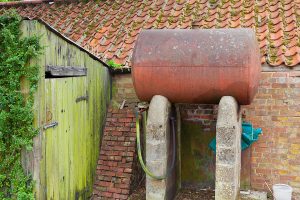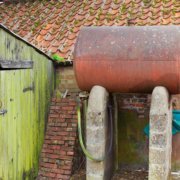
Domestic oil storage tank in a rusty state.
From gas boilers to ground source heat pumps, there are an array of options for heating your holiday home. Some will have turned to renewable energy to supplement or replace more traditional heating fuels. Meanwhile many rural holiday homeowners still rely on heating oil to keep their cottage warm.
There are benefits of having a heating oil tank, such as reliability and convenience however they also require care and maintenance. Let’s have a look at what you should be doing to maintain your system so it runs efficiently and effectively.
Annual service
Just as your car needs an MOT each year, your heating oil tank and system requires an annual service and inspection. This should be carried out by a technician who is registered with Oftec (the Oil Firing Technical Association). If you’re not sure if a business is registered with Oftec check their accreditation. To do this and search for local engineers visit their website here.
Regular checks
Regular checks can save vast amounts of money and damage by spotting issues early.
It’s really important not to rest on the laurels of an annual check and believe that this represents a job done. As with other areas of your holiday home, it’s vital that your oil tank is checked on a regular basis, and that this is included in your standard holiday home maintenance checklist.
If you live away from your holiday home, ensure that someone has the responsibility of checking the oil tank and that they keep a record of each time it is checked.
It can be prudent to undertake checks more regularly during the winter months. During this time the tank will also be exposed to the worst of the British winter weather.
What to look for
First and foremost, see if you can find any signs of damage or wear. Bulges, scratches, rust, and even discolouration can be a sign that there is something wrong. It can be useful to have pictures of the tank when it was new so you can compare any possible discolouration.
Vents and gauges should be securely closed, as any rainwater, insects, or dirt that gets in could cause some serious damage to both the tank and your oil.
You will also need to look around the tank, ensuring that no plants are growing near it and that access to the oil tank is clear.
Alarms and gauges must be working properly, so check them as you would the smoke alarm in your home. A faulty alarm could prevent you from realising that your oil supply has reached a critical level, thus leaving your guests without heating.
The risk of water
Water is one of the biggest threats to oil heating tanks. It can damage and corrode heating systems, and reduce the efficiency of your oil. It is sensible to take precautions to ensure that water doesn’t find its way in.
If you suspect that your tank has been invaded by water, there are two checks you can undertake. Firstly, take a look at the bottom of the tank; if there are signs of a darkened area this could be erosion caused by water. Alternatively, you can use a water-finding paste which is put onto a long stick and dipped into the tank. The colour the paste turns will inform you if there is water in your tank.
Oil leaks
Causing pollution is illegal, and oil can be harmful to the environment, therefore If you discover a leak or spill it needs to be fixed immediately. Call in a professional to repair the leak. If you discover a leak which leads to a spill call the Environment Agency’s 24-hour incident hotline on 0800 807060. It would also be wise to call your insurers as soon as you are aware of the incident.
Are you seeking a holiday home insurance provider for a rural holiday cottage or complex with oil fired heating? It’s important to ensure you have the right cover.
If you have questions about heating oil tanks and your holiday home insurance policy, get in touch via cottages@boshers.co.uk or give our team a call.
Boshers offer specialist holiday home insurance to owners across the UK. Require a quote for your holiday apartment, cottage or complex? Please give us a call on 01237 429444.

